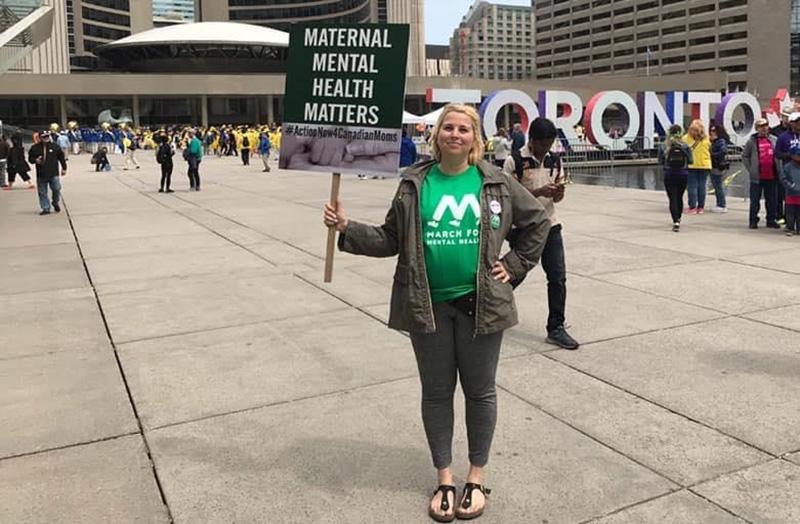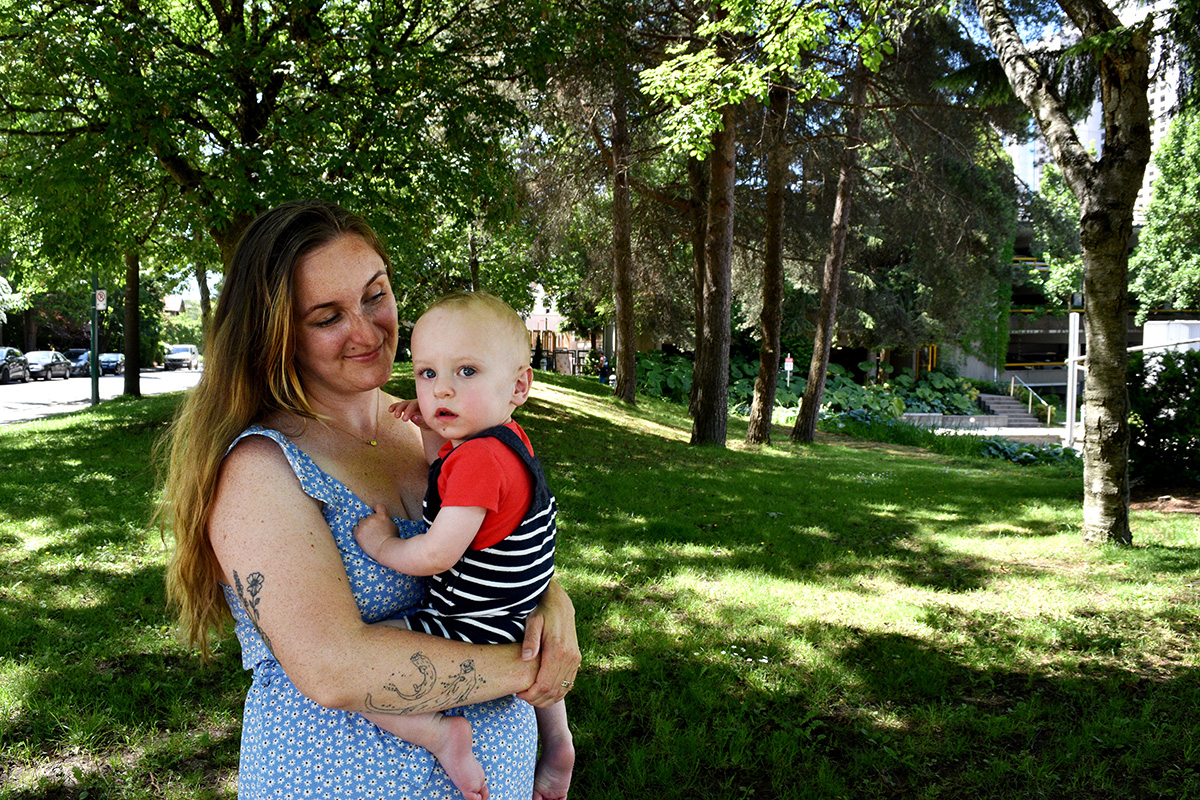When Taylor Johnson gave birth to her first child in January 2020, she’d heard that new parents sometimes struggled with mental health issues. She just never expected it would happen to her.
Johnson’s son, Anderson, was born with a congenital heart defect and was scheduled to go in for surgery at four months old. But Anderson was born just weeks before the World Health Organization declared COVID-19 a pandemic, and due to pressures on B.C.’s medical system, his surgery was repeatedly delayed.
“It was really rough,” Johnson says. “It was eight months of feeding tubes and 36 trips to the hospital.”
The stress of being a new mom and parenting a very sick newborn during a global pandemic fuelled Johnson’s anxiety, and it also prevented her from seeking support.
“My brain was so set on ‘Okay, well is this just new mom stress?’ ‘Is this pandemic stress?’ ‘Is this having-a kid-in-heart-failure stress?’ I had no idea what everything was and where the line stopped and blurred over,” she says.
Johnson, like many who’ve recently given birth, was dealing with significant life changes as well as hormonal fluctuations, both of which likely contributed to the development of postpartum anxiety disorder — a lesser-known, and often co-occurring cousin of postpartum depression.
Johnson also didn’t know that “baby blues,” or mood changes or sadness that follow the birth of a child, should only last a few weeks post-birth. When she was still experiencing postpartum anxiety four or five months after Anderson entered the world, she says, it took her a little while to realize something more was going on.
More common than we think
About 80 per cent of birth parents experience “baby blues” following the birth to a child. (About 10 to 32 per cent of adoptive parents may also experience feelings of depression following adoption.)
According to one survey, perinatal mental illness, which spans the time from conception to one year postpartum, is estimated to impact 20 per cent of women and 10 per cent of men (this survey did not collect information on non-binary parents).
Black, Indigenous, people of colour, people with disabilities and LGBTQ+ populations experience even higher rates of perinatal mental illness on average. Indigenous mothers are 20 per cent more likely than white mothers to suffer from prenatal and postpartum depression in Canada. There is limited research on Black perinatal health support services in Canada, but one U.S. study found that 40 per cent of Black mothers will suffer from postpartum depression, double the rate of the general population.
Dr. Liisa Galea, professor of psychology and neuroscience at UBC and lead of the Women’s Health Research Cluster, says that researchers could predict that a pandemic would exacerbate perinatal mental illness. “Our biology is reacting to our environment,” she says. “The stress of all of that has affected our physiology.”
A complex set of factors, including hormonal and structural changes to the brain, genetics, complications during pregnancy and the availability of social supports, Galea says, affect the development and severity of perinatal mental illness.
“There are brain changes [during pregnancy], and they’re nothing to be afraid of — they’re natural changes,” Galea says. “But some of the changes that occur are very similar to what you see in depression and anxiety outside of the pregnancy.”
These changes, Galea says, generally clear up pretty quickly in parents who don’t have a history of mental illness, and who have the proper social supports in place.
But education on perinatal mental health risks and coping methods for new parents are still not widespread. Johnson only learned that she scored high for indicators of postpartum anxiety and depression after her midwife suggested she participate in a study at UBC.
Afterwards, Johnson connected with a counsellor and joined a peer-support group with the Pacific Post Partum Support Society. The experience offered her the ability to speak openly about her experiences with others who understood.
In September 2020, Anderson was finally able to have surgery. And by this January, thanks in large part to the peer-support group at PPPSS, Johnson was in a much better place. If she hadn’t signed up for the study, she may never have thought to seek out mental health resources.
“If I didn’t happen to have my public health nurse call me, I have absolutely no idea how long it would have taken,” Johnson says. “I really really lucked out.”
Supports plagued by waits
For many pregnant people in B.C. and across Canada, adequate perinatal mental health care isn’t always readily available when needed. In one study, 25 per cent of birthing parents had consulted a health professional for mental health care, still 37 per cent say they had unmet mental health-care needs.
Access to resources and protocols at visits to doctors’ offices can vary widely based on where you live. Advocates are hoping to fix that.
On May 12, the Canadian Perinatal Mental Health Collaborative began organizing a letter-writing campaign in Ontario asking members of Parliament to create a bill to address perinatal mental health needs.
The next month, in Ottawa, Vancouver MP Don Davies introduced a private member’s bill in the House of Commons that outlined similar goals.
Bill C-306, announced on June 3, calls for preventative measures like universal early mental health screening, improved training for health-care professionals, and reduced barriers to perinatal mental health support services.
Mental health screenings, though recommended by best practice guidelines, are not uniformly practiced across all provinces and territories. When provinces do have universal screening protocols, many patients are still plagued by other barriers like private therapy costs or long wait times to access mental health care covered by their province — or they aren’t able to find the type of support they need where they live at all.
“Access to mental health services is quite uneven,” Davies said. “Mental health care is a core component of overall health, and I think we know that intuitively, but if you need to go to a psychologist or you need to go to talk therapy, that’s not covered. It’s time that we fix that.”
Although this bill would not outline specific funding measures for improved mental health supports and access in B.C., Davies hopes a national strategy will provide a structure to improve things like screening standards and allocate more research funding to this area.
The bill follows a non-binding motion to develop a national perinatal mental health strategy, introduced by MP Heather McPherson, which passed unanimously on May 5.
Though Bill C-306 would become law if passed, it still has a long way to go.
“Going this route — a private member’s bill — is not a guaranteed success. But it does accomplish getting more awareness and getting it onto the radar of the government,” says Patricia Tomasi, a co-founder of the Canadian Perinatal Mental Health Collaborative.
Tomasi herself lived with undiagnosed anxiety and depression prior to her first pregnancy. At the time she didn’t realize this made her more likely to develop antenatal or postpartum mental illness. “I didn’t think to bring it up, and my obstetrician didn’t ask me any questions,” she says.
“I started to have panic attacks at two months pregnant and was really anxious throughout my entire pregnancy,” Tomasi adds. “I started to wonder, ‘Is this me, is this just me being nervous about motherhood?’”
Tomasi’s doctor initially refused her medication, because she did not rank high on the postpartum depression scale — despite the fact that she was experiencing anxiety, not depression.
After the birth of her first child, Tomasi developed postpartum bipolar disorder and began experiencing postpartum psychosis, which had devastating impacts on her life and well-being.

It wasn’t until her hormones shifted again during her second pregnancy that Tomasi began to feel better. She realized her mental illness was connected to changes she was experiencing during pregnancy.
Studies have shown the links between existing mental illness and postpartum mental illness. One study found that bipolar women have at least a one in 4 risk of suffering a severe reoccurrence of illness following delivery.
Those who are genetically predisposed to developing bipolar disorder are also at a high risk of triggering bipolar episodes during and after pregnancy.
“After getting on medication I started to feel better and actually enjoyed motherhood,” says Tomasi. “The second time around, I could have also benefited from therapy, but unfortunately there are long wait lists, and therapy can be extremely hard to get in Canada.”
‘This isn’t a one-size-fits-all’
If passed, Bill C-306 will also include the expansion of culturally relevant and gender-affirming services. Organizers say the supports named in the bill are needed now more than ever.
The Pacific Post Partum Society says that calls to their help line have increased by more than 20 per cent over the last year. A similar trend was echoed by a study released by the CMAJ last week that showed a 30-per-cent increase in demand for postpartum mental health services during the pandemic.
“We don’t have adequate support for people at all,” says Cora Beitel, a registered midwife, about perinatal mental health options in B.C. The pandemic has meant that more people are struggling emotionally during pregnancy, and that already limited resources get stretched even thinner.
According to Beitel, many of the families they’ve worked with have faced wait times up to eight months from referral dates when seeking perinatal mental health resources through the provincial health-care system. Private counselling alternatives are unaffordable for many new parents.
“If someone needs to access mental health resources,” they say, “they need to access that now, not at eight months from now.”
Support groups and services offered by non-profits have become a popular resource for new families who may not be able to access other services. This is especially true for groups whose needs are underrepresented in traditional health-care options.
Beitel works with the Strathcona Midwifery Collective, where they also co-facilitate the Trans and Queer Pregnancy and Parenting Group.
“It’s really important for people to have safe care, specifically for trans men and queer families,” Beitel says. “This looks like having care providers that have experience caring for trans and queer families, because it isn’t a one-size-fits all.”
It’s important for health-care providers to demonstrate ease when asking about pronouns or using names that may be different than the one on their patient’s care cards. Beitel adds. It’s also important for health-care providers to be trauma-informed, understand experiences like gender dysphoria, and learn from their patients what kinds of anatomical terms may be triggering.
Trans and queer affirming health-care resources can be especially difficult to access in more rural areas of the province. Since their trans and queer pregnancy and parenting group has been meeting virtually, Beitel has seen a growth in attendance from those living in more remote parts of B.C.
But, Beitel says, the move online hasn’t worked for everyone. “There’s been both attrition and growth at the same time,” they say.
Emily Garner leads the Two-Spirit, queer and trans postpartum support group at PPPSS, which began as a pilot project in September 2020. When she was pregnant with twins in 2008, Garner says everything from ultrasound appointments to conversations in grocery store lineups assumed a lot about her and her non-binary partner that didn’t fit their experience as parents.
“It’s really just sort of everyday friction of discrimination and marginalization,” she says. “That builds and can contribute to perinatal mood and anxiety disorders.”
Garner’s experiences in health-care systems contributed to her fear of asking for help when she began struggling with postpartum anxiety.
“As a queer parent, I was always sort of struggling to protect my family from discrimination and then to prove that we were good enough parents,” Garner says. “A lot of my anxiety sort of focused around being perfect.”
After finding support for her postpartum anxiety, Garner was inspired by the peer-support model at PPPSS and became involved with the organization in April 2018. She joined as staff in October 2018.
For Garner, this peer-led support has been instrumental. “We can share in a place where we can kind of speak about the absolute delight of parenting in one breath, and then in the next share about the bleakness of depression and anxiety,” Garner says. “It’s a place where you can really show up as you are in the moment.”
From ‘lip service’ to action
But there are a number of service gaps within national and provincial perinatal health care that can’t be filled by support groups alone.
When the Canadian Perinatal Mental Health Collaborative polled 435 health-care providers across Canada, 87 per cent said they believe people from diverse backgrounds encounter barriers to accessing perinatal services based on things like language, cultural and cost barriers — something that will need to be addressed directly in health-care service provision, where the barriers are occurring.
The collaborative’s letter writing campaign has since evolved into a campaign to support Davies’ bill. They’ve been using the hashtag #passbillC306 on social media and have urged people to write to members of Parliament and pressure them to learn more about perinatal mental health.
Tomasi hopes MPs will vote to pass the bill after it enters its second reading, which will likely be in the fall. If an election is called before it is passed, the bill will die, and would need to be reintroduced. Davies says this is something he plans to do if he is re-elected.
For many, though, the need for accessible perinatal mental health services is urgent. Suicide accounts for 5.3 per cent of perinatal deaths among new birthing parents and there is evidence that suggests that perinatal mental illness has intergenerational impacts if untreated.
“If we do not properly assess and treat birthing persons for perinatal mental illness or prevent it from happening in the first place, we’re doomed to repeat this mental illness cycle over and over again,” says Tomasi.
“We give a lot of lip service to mental health these days... it’s time for action.” ![]()
Read more: Health, Gender + Sexuality
















Tyee Commenting Guidelines
Comments that violate guidelines risk being deleted, and violations may result in a temporary or permanent user ban. Maintain the spirit of good conversation to stay in the discussion.
*Please note The Tyee is not a forum for spreading misinformation about COVID-19, denying its existence or minimizing its risk to public health.
Do:
Do not: